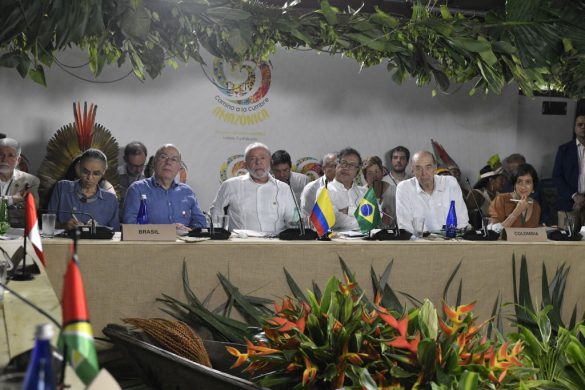Hvordan påvirker klimaforandringerne biodiversiteten i regnskovene? Ny undersøgelse giver et bud på en ny måde at finde ud af, hvordan følsomme biologiske systemer i regnskovene reagerer, når klimaet bliver varmere eller køligere.
University of Exeter, 6 februar 2013: Tropical rainforests are often called the “lungs of the planet” because they generally draw in carbon dioxide and breathe out oxygen. But the amount of carbon dioxide that rainforests absorb, or produce, varies hugely with year-to-year variations in the climate.
In a paper published online this week (Feb 6 2013) by the journal Nature, a team of climate scientists from the University of Exeter, the Met Office-Hadley Centre and the NERC Centre for Ecology & Hydrology, has shown that these variations reveal how vulnerable the rainforest is to climate change.
Hvad sker der med Amazonas?
Lead author Professor Peter Cox of the University of Exeter explained: “We have been struggling for more than a decade to answer the question ‘will the Amazon forest die back under climate change?’
Our study indicates that the risk is low if climate change is associated with increased plant growth under elevated carbon dioxide. But if this effect declines, or climate warming occurs due to something other than a carbon dioxide increase, we expect to see a significant release of carbon from tropical ecosystems”.
Ny metode – CO2 i atmosfæren giver svar
The study reveals a new way to find out how sensitive biological systems are to changes in climate. The key was to learn how to read the year-to-year variations in the concentration of carbon dioxide in the atmosphere. Carbon dioxide increases each year as a result of burning fossil fuels and deforestation.
But the amount it goes up from one year to the next depends on whether tropical forests are absorbing carbon dioxide or releasing it – and this in turn depends on whether the tropical climate was warmer and dryer than usual, or wetter and cooler. So the trace of carbon dioxide in the atmosphere holds a record of how the lungs of the planet respond when the climate warms or cools.
Læs mere: http://www.eurekalert.org/pub_releases/2013-02/uoe-lot020413.php
Læs fra: “The team studied how these year-to-year variations in carbon dioxide concentration.”














